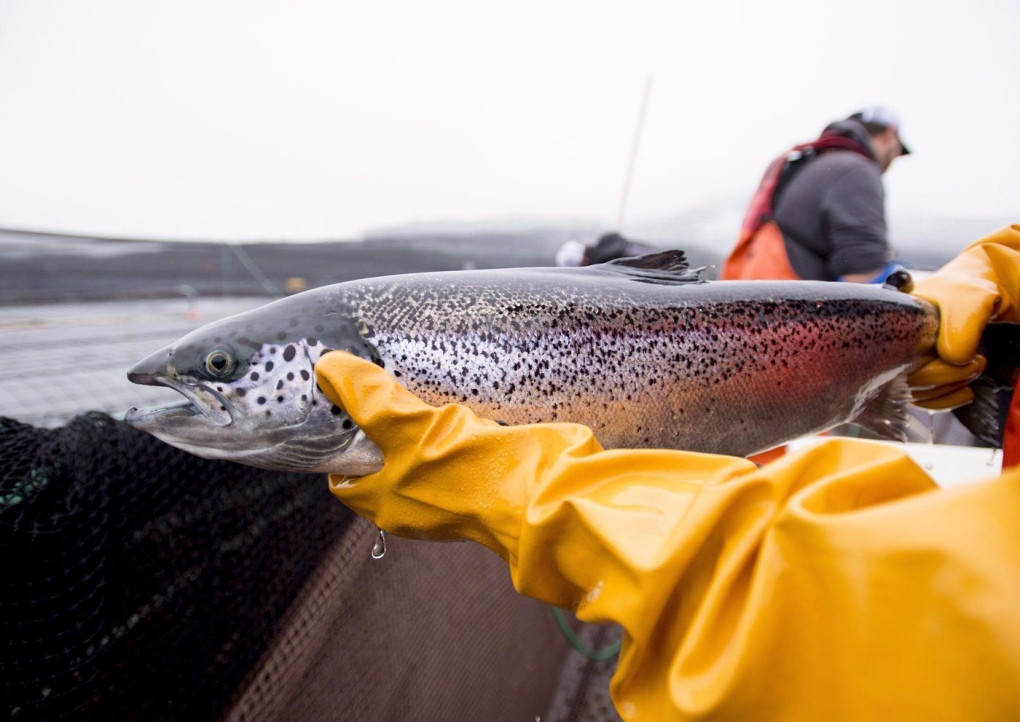Eliminating open-net fish farms in B.C. would cost taxpayers billions: report
 A farmed Atlantic salmon is seen during a Department of Fisheries and Oceans fish health audit near Campbell River, B.C., on Wednesday, Oct. 31, 2018. THE CANADIAN PRESS /Jonathan Hayward
A farmed Atlantic salmon is seen during a Department of Fisheries and Oceans fish health audit near Campbell River, B.C., on Wednesday, Oct. 31, 2018. THE CANADIAN PRESS /Jonathan Hayward
The proposed federal ban on open net-pen salmon farms in British Columbia coastal waters will cost taxpayers billions and seriously impact Canada's economy, food security and Indigenous communities, says a report commissioned by the BC Salmon Farmers Association.
The ban would result in $9 billion of "unnecessary costs" to taxpayers to close the sector and subsidize companies with "unproven closed containment technology," said the report by Ottawa-based economics consultants RIAS Inc.
It said there would be a $1.17 billion drop in annual economic activity -- including $133.6 million among First Nations -- as well as the elimination of than 4,500 jobs and the reduction of 50,000 tonnes of farm-raised salmon per year.
In June, the federal government announced it would delay the closure of open net farms until 2029 to facilitate a transition to closed containment systems.
"The proposed ban is a reckless decision by the (Justin) Trudeau government that ignores both science and economic reality,” Brian Kingzett, BC Salmon Farmers Association executive director, said in a statement Thursday.
"B.C. salmon farming companies, suppliers and First Nations within whose territories we operate have communicated to the federal government that transition cannot be a ban on marine net-pen salmon farms in less than five years and maintain a viable farmed salmon sector."
The report was released at a news conference in Ottawa Thursday by the B.C.-based Coalition of First Nations for Finfish Stewardship and salmon farming industry representative, David Kiemele, Cermaq Canada managing director.
Open-net fish farms off B.C.'s coast have been a major flashpoint connected to the debate over the decline of Pacific salmon stocks.
Environmental groups and some First Nations say the farms are linked to the transfer of disease to wild salmon, while supporters say studies indicate the farms' risks are minimal and cite economic costs if operations are phased out.
Some B.C. Indigenous leaders have called on the federal government to stand by plans to transition away from open-net salmon farms.
They include Bob Chamberlin, First Nations Wild Salmon Alliance chair, who said he was also in Ottawa this week meeting with federal government officials about the status of the salmon farm transition.
"We are working with the government to further assist it to reach its stated goals," Chamberlin said in an interview from Toronto.
He said the group represents more than 120 B.C. First Nations.
But the salmon farmers and Coalition of First Nations for Finfish Stewardship said in a statement they are now urging Trudeau to "consider a more realistic, no-cost-to-taxpayers alternative to transition that would achieve the same outcome as a ban without imposing devastating impacts on the sector, on First Nations’ rights, and on coastal communities in B.C."
B.C.'s salmon farmers have also "been committed to continuous innovation," said the statement. "Mandating the sector to transition to unproven technologies in a short time frame ignores the willingness of B.C. salmon farmers to administer alternative innovations that can achieve the same outcome."
This report by The Canadian Press was first published Nov. 28, 2024.
CTVNews.ca Top Stories

FORECAST Weather warnings issued for nearly all of Canada's provinces and territories
Nearly every province and territory in Canada is subject to weather advisories heading into the weekend.
NEW When do I receive federal benefits this year? Payment dates for 2025
From the Canada Child Benefit to Old Age Security, federal payment dates have been determined for 2025. Find out when you can expect your payments.
opinion Trump in 2025: A fluid and fragile global landscape awaits the president-elect
The road ahead for U.S. President-elect Donald Trump is fraught with peril, and the landmines that await could severely undermine his ambitions amid the slightest miscalculation, writes Washington political analyst Eric Ham in his column for CTVNews.ca.
A missing surfer in Australia is believed dead in a shark attack, police say
A surfer missing in Australia is believed to have died in a shark attack, authorities said Friday, as they searched the waters where the man disappeared.
Pickering pausing in-person meeting due to alt-right threats, mayor says
Pickering Mayor Kevin Ashe says the city is pausing all in-person meetings, moving them to a virtual format, for the time being due to “alt-right” threats.
2025 is a perfect square year: What makes that so interesting to mathematicians?
Mathematicians aren’t just ringing in 2025, they’re also celebrating the start of a perfect square year.
Industry minister talks TikTok, Elon Musk and the future of his AI bill
As the federal government battles TikTok in court over Ottawa’s order to close its Canadian offices, Canada's industry minister says families should make their own decisions about whether to continue using the app.
Athabasca 'chop shop' bust yields millions in stolen vehicles, heavy equipment: RCMP
RCMP have made what they call a "major recovery" of stolen property in Athabasca.
Canada crashes out of world juniors in quarterfinals for second straight year
Canada has been eliminated from the world junior hockey championship with a 4-3 loss to Czechia in the quarterfinals.

































